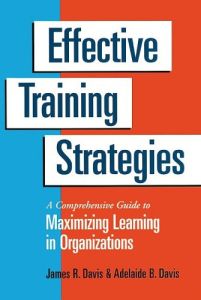Join getAbstract to access the summary!

Join getAbstract to access the summary!
James R. Davis and Adelaide B. Davis
Effective Training Strategies
A Comprehensive Guide to Maximizing Learning in Organizations
Berrett-Koehler, 1998
What's inside?
Training strategies can tell you how people learn, but only you can decide what your employees need to know, and how they can be inspired to take the whole thing seriously.
Recommendation
James R. Davis and Adelaide B. Davis present a comprehensive guide to seven major training strategies, along with underlying learning theories, and examples of how different companies have used these approaches. The book draws on conversations with trainers and the results of research on learning from diverse fields - including psychology, sociology, philosophy, and communications. Its easy organization allows you to quickly extract its major principles, which are highlighted in bold-faced summaries, bullet-pointed lists, numbered rules, and final chapter summaries outlining major conclusions. If you want more depth, you can read the capsule descriptions of companies that have used the approach featured in a chapter. getabstract recommends this excellent guide to academicians, training professionals, and any managers charged with training new or existing employees.
Summary
About the Authors
James R. Davis is a professor of higher education at the University of Denver. His books include Better Teaching, More Learning and Interdisciplinary Courses and Team Teaching. Adelaide B. Davis has served as a training analyst for COPASA, a public utilities company, and has taught human resource management.





















Comment on this summary